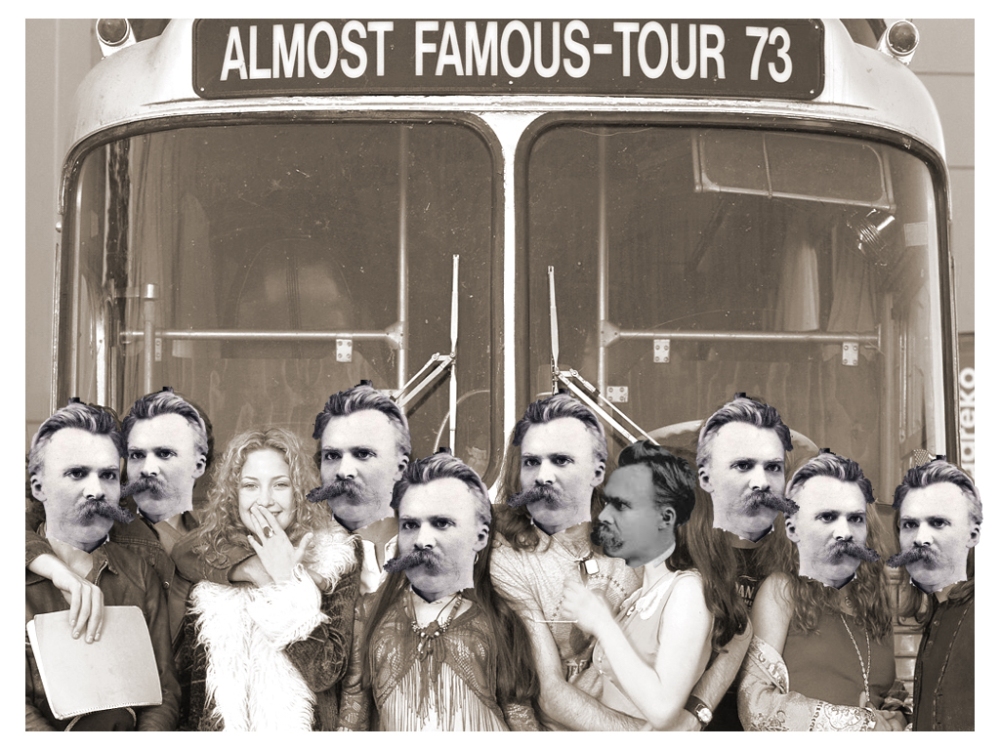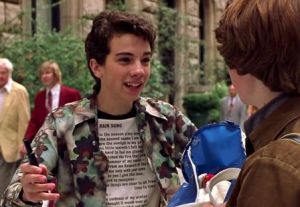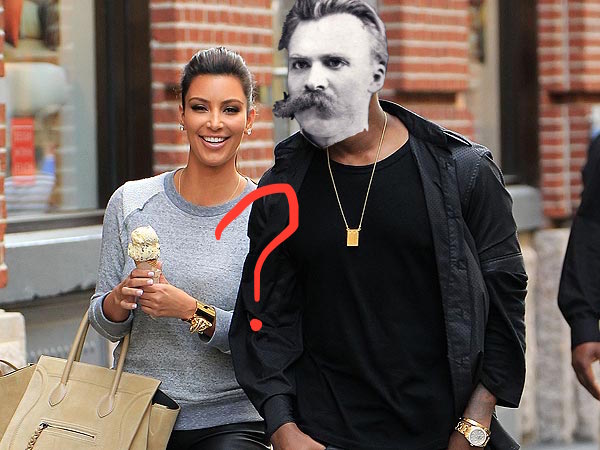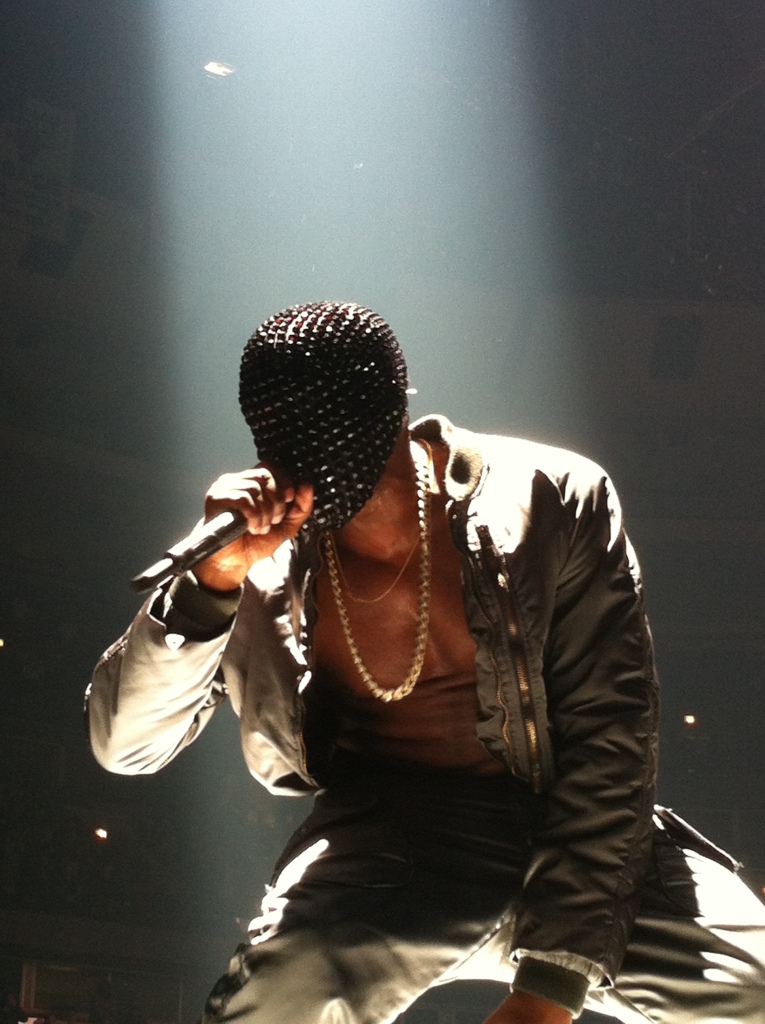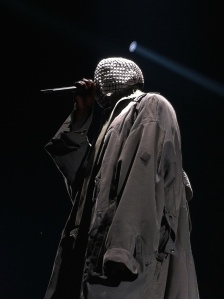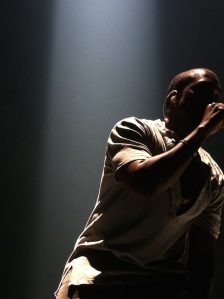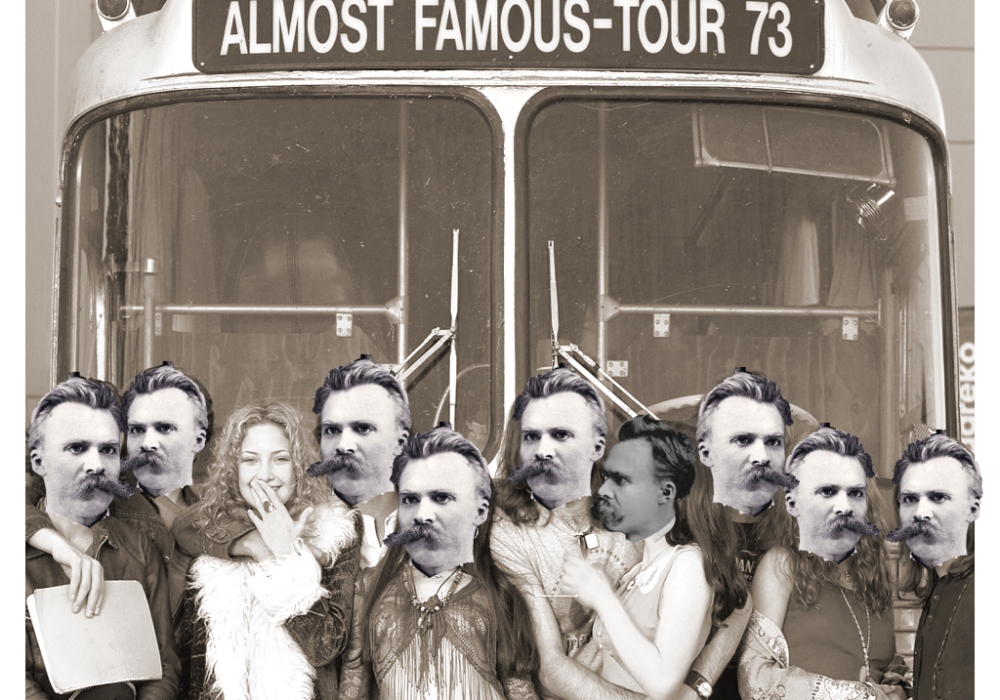
Almost Famous: A Nietzschean Lesson In Honesty
Song of the day: “Fever Dog” by Stillwater
For someone who held a “movie club” on Friday nights in high school because he didn’t roll with the partying crowd, I’ve become a surprisingly TV-focused guy over the past year. Movies take a lot more effort to watch since they aren’t packaged in convenient 23 or 41 minute chapters, and because my lack of a 9-to-5 job means that I essentially work seven days a week, I can rarely justify taking two or more hours out of my day to sit and consume visual culture. Sometimes, though, a life situation calls for a particularly special movie. In July, as I languished in Lake Tahoe without a clear passion or plan for the future, that movie was The Graduate. And last night, nearly two months into my career as a music journalist, that movie was Almost Famous.
What better movie for a music journalist to watch than one that tells the story of a fifteen-year-old writer who hits the road with one of his favorite bands? What better life could I imagine for myself than getting to experience every aspect of that band’s tour, from crazy parties in Topeka and Los Angeles to legendary performances in Cleveland and New York City, and having the chance to pick their brains about their songs and their lives? When I read that Cameron Crowe wrote Almost Famous as a semi-autobiographical tale, and that William Miller’s experiences are based on his own, I couldn’t help but feel more than a little jealous. The early 1970s were different times–before the blogosphere democratized the Internet, mega-amplified the supply of writers, and made it damn near impossible for people well out of high school to become paid contributors to any magazine, let alone Rolling Stone. Then again, reading about Crowe’s life and success in both journalism and screenwriting gave me another inspiring figure in my chase for the Dionysian.
I started watching Almost Famous around midnight, not expecting that it would run well over two and a half hours. But of all the late nights I’ve had over the past several years because I couldn’t shut off a screen, this was probably the most worthy. Not only did I take away some great lessons in journalism, but Nietzsche and his philosophy made their inevitable entry to my thoughts as the movie progressed.
Almost Famous is, first and foremost, a movie about truth. Literally so, as the first lines read:
Elaine: You want to be Atticus Finch. Oh, that makes me feel so good.
William: I like him.
Elaine: Why?
William: Well, he’s honest.
William Miller (Patrick Fugit) has been raised by his über-helicopter Elaine (Frances McDormand), who puts today’s “tiger moms” to shame, and early on in the film we find out that she’s lied to him about his age. “Adolescence is a marketing tool,” she quips, defending her actions as her rebellious daughter Anita (a young and characteristically deadpan Zooey Deschanel) takes the opportunity to attack her. Elaine is a walking contradiction throughout much of the film: the college professor who flaunts her intelligence as proof that she is always right, yet is blinded by her own dogmatic views of the world and incapable of acknowledging her children’s ability to think independently and make their own decisions. Nominally in the pursuit of “truth” in her chosen profession, she’s willing to lie to her son to suit her own pathological need for his love and devotion. And when Elaine’s parenting tactics fail, she can’t accept the reality of her failure. “She’ll be back,” she remarks as Anita leaves home to become a stewardess. Even in the face of her daughter’s clear joie de vivre, Elaine remains convinced that her system of morals is correct and will prevail.
Of course, this thinking violates Friedrich Nietzsche’s dictums against any type of permanently held valuations. Nietzsche’s thought system is unique among philosophers in that it’s more of an anti-system, an encouragement to the constant creation and destruction of values and the free expression of life energy unfettered by preexisting people, beliefs, or experiences. Elaine can’t even grasp any sort of life that deviates from what her books and studies have taught her, as is evident in her consistent check-ins with William as he travels the country with Stillwater. She freaks the music world out with her intensity and feverish worry about 1) keeping William safe and 2) keeping his morals intact. The Stillwater tour isn’t a place where traditional morality has any sort of place, and she knows this–it’s a “Valhalla of decadence.”
How incredible it is, then, that Frances McDormand makes us feel for Elaine when she walks out of her classroom, and that in the end she actually welcomes the man who killed her son’s story into her house. I’ve always admired McDormand for her work in Fargo, but this performance I found more powerful.
On the whole, the guys in Stillwater aren’t particularly more thoughtful than any other early ’70s rock band. We do get to see Jeff Bebe (Jason Lee) offer up a paraphrasing of Freud’s three-part psyche (or Nietzsche’s Apollonian and Dionysian):
“On the whole, I’d say most of the fuck-ups in the world come from the brain and not the instincts. My whole thing is to try and make my brain go away but I can’t, except on-stage. The brain, I think, should be a softening influence on the instincts but the instincts should drive. Trying to reconcile the brain with urges that come out of millions of years ago. The way the brain interprets these instincts is… a heavy trip. Usually I’m brain and Russell is instincts. But on the days when we’re both instinct, that’s when we’ve made the music people know best, because… it’s the best.”
But even though Bebe has identified this truism that Nietzsche first pointed out in The Birth of Tragedy, he utterly fails to overcome his brain and submit to the music. As a result, he comes across as a pretty petty guy, jealous of Hammond’s fame and skill and worried that he’s going to be left behind. Rather than trying to let the band’s stage relationship define their personal relationship, he puts things the other way around and as a result there’s tangible friction throughout the tour. William, the ever-present and omniscient observer, picks up on this natural struggle that accompanies any band’s growing fame–examples of intra-band rivalries abound, from The Beatles to Van Halen to Duran Duran, and they need to be overcome if the group is to survive.
The way to overcome these difficulties jives with Nietzsche’s approach to friendship: that friends exist to challenge and encourage one another in the process of self-overcoming. In the context of a band, which exists based on the Dionysian art form of music–throughout the movie, we see Stillwater spontaneously breaking into song, most notably Dr. Hook’s “The Cover of the Rolling Stone”–the self-overcoming happens when the members fully immerse themselves in the emotions that come from their songs and the settings that contribute to their performance. I think Nietzsche would have loved various aspects of the rock star life Stillwater leads on the road, particularly the complete loss of self that Russell Hammond (Billy Crudup) experiences after he drinks LSD-laced beer at a party in Topeka. But he would have criticized the aspects of that lifestyle that lead to the members’ self-dishonesty: the ego-driven infighting, the concern with money that Dennis Hope (Jimmy Fallon) expertly exposes within them after their Cleveland show, and above all their all-consuming desire to look “cool.”
Russell Hammond epitomizes “cool,” from his soft, sensual eyes and his expert guitaristy to his casual galavanting at various parties and easy deferrals of William’s interview requests. And his “cool” factor has attracted the adoration of Almost Famous‘ most enduring character, Penny Lane (Kate Hudson in her breakout role). Penny lives in a world of fantasy, consistently talking about the “real world” and desire to move to Morocco once she retires from the groupie life. She possesses an imagination and a romance that can’t help but inspire everyone she encounters; she’s the personification of rock and roll’s glorious escapism, Hammond’s on-the-road girlfriend who far exceeds his other flings and William’s goddess of music, which is his religion. The only trouble with Penny Lane is that she’s incapable of grasping reality.
Penny: Why are you yelling at me?
William: I thought we were going to Morocco! There’s no Morocco. There’s never been a Morocco. There’s not even a Penny Lane. I don’t even know your real name.
Penny: If I ever met a guy in the real world, who looked at me the way you just looked at me…
William: When and where does the real world occur? I am…really confused here. All these rules and all these saying…and nicknames…
Penny: Honey, you’re too sweet for rock and roll.
This happens just before William reveals that Hammond has sold Penny to Humble Pie for “fifty dollars and a case of beer,” a truth that finally begins to crack her. Imagination is vital to a fulfilling life, but untempered by a grounding in the “real world,” it inevitably causes a terrifying and crushing nihilism. Who is Penny Lane? She fancies herself the spirit of rock and roll, the greatest fan in the world (which she is)…but in the end she’s being called “that groupie” by Bebe when the band thinks they’re about to die in a plane crash. As much as Hammond realizes he needs her presence to be inspired–in their phone reconciliation, he tells her, “I’m never as good as when you’re there, and I can see myself, the way you look at me…and I’m sorry”–she needs him to allow for her flight from the pressures of time, obligations, and anything else “normal” people face on a daily basis. The Danish philosopher Søren Kierkegaard writes about achieving the balance between the infinite and the finite as a necessary aspect of reconciling the self with itself and creating harmony. Penny, though doesn’t have a finite self. She has no conception of the requirement for life’s energy to be put into form–Nietzsche’s definition of the Apollonian–outside of an assumed name. The result is heartbreak when her romance comes to an end and, with it, the miracle of the Stillwater tour.
It’s left to William to be the voice of truth who reconciles the band and Penny with themselves, putting them in touch with authenticity and enabling their self-overcoming. At the beginning of his assignment with the band, he’s given a simple directive by Hammond: “Just make us look cool.” And he’s more than willing to oblige, since he’s a huge fan of Stillwater. But he’s too astute not to notice the internal differences threatening to tear the band apart, and his love for Penny, his rock and roll angel, is too strong for him to just let the band off easy when they show their true apathy towards her on their plane ride from hell. So begins a struggle within the young writer; he loves the band, and he loves being friends with them, but that friendship is predicated on pandering to the image they want to uphold in the piece he writes about them for Rolling Stone. And even though he’s honest with Hammond and the others in private conversation, exposing the truth of what happened on their tour to the public would likely spell the end of his relationship with Stillwater. In need of advice at the eleventh hour as he’s finishing his feature, he calls Lester Bangs (a typically perfect Philip Seymour Hoffman), who offers him the best tips on friendship and rock journalism I’ve ever heard:
See, friendship is the booze they feed you. They want you to get drunk on feeling like you belong. They make you feel cool. And hey, I met you. You are not cool…I know you think these guys are your friends. But if you want to be a real friend to them–be honest and unmerciful.
In writing and in life, it’s tough to be honest and unmerciful. I’m friends with people because I like them and they like me, and saying anything that could be hurtful is not something I ever like to do. This truth rings especially strong in my journalistic exploits, where I’m always wary of the effect that a negative review will have on my ability to access bands and get better stories. Being called “The Enemy,” a moniker that Stillwater imposes on William (first jokingly, then endearingly, then finally sincerely after they read his brutally honest “think piece” on them), isn’t a nice distinction. But honesty lies at the core of Nietzsche’s anti-system. It’s impossible to self-overcome without the ability to acknowledge your own flaws, and it’s impossible to encourage and challenge your friends to self-overcome without acknowledging theirs. The übermensch is brave in that he expresses life energy through all moments of life–the happy, the sad, the bitter, the angry, the ecstatic–and affirms everything that happened, even going so far as to will that the course of events that has occurred should occur over and over again into eternity.
That William eventually writes the piece he does, and that Stillwater eventually decides to do him right and admit that his facts are correct, is central to Almost Famous’ central tenet of honesty. It’s better to tell your son the truth about his age instead of lying to him. It’s better to face the jealousies and the fact that everything is not okay in the band instead of trying so hard to project a “cool” face to the public eye. And it’s better to fall in love with the music and its soul–Penny Lane–than to allow other concerns to get in the way and interrupt the authenticity of rock and roll. Once the truth is out in the open, the arduous process of self-overcoming can begin, and with it the tremendous respect bestowed upon the aspiring übermenschen by those who understand their struggle.
As I go forth into the world of music journalism, these are lessons I’ll carry with me. It does me no good to lament the fact that I’m not scoring the Rolling Stone cover story–if I build a reputation for honest work, fair appraisals of music, and a knack for keen observation, I’ll get there eventually.
P.S. How adorable is young Jay Baruchel in this movie?
P.P.S. Rolling Stone needed the fictional fact checker from the movie for its “A Rape On Campus” story.
